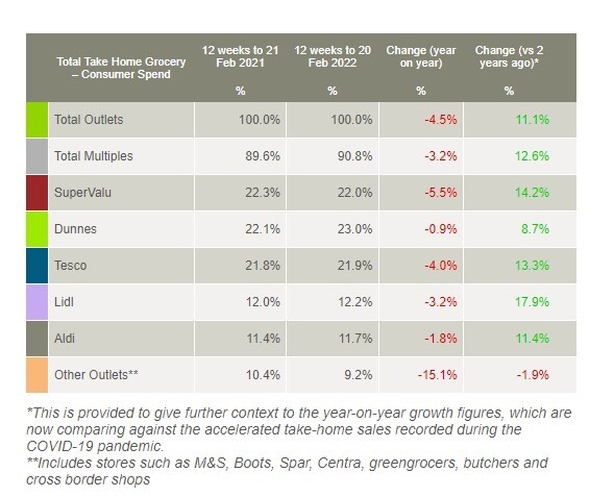Grocery price inflation over the 12 weeks to February 20 hit 2.4% - the highest level since June 2020 - new figures from Kantar show today.
It also marked the seventh consecutive month of accelerating inflation.
Kantar said the number of products sold on promotion fell by 10.9% year on year as retailers sought to manage mounting supply costs.
"Prices are rising across the board and that's really being felt at the grocery tills," Emer Healy, senior retail analyst at Kantar, said.
"We’re now starting to see this reflected in shopper behaviour, with people increasingly opting for private label lines over branded products in an attempt to drive down the cost of their weekly shop," she added.
Kantar also said that take-home grocery sales fell by 4.5% over the 12 weeks to 20 February, but spending still remains 11.1% higher than before the Covid-19 pandemic.
It also said that further loosening of Covid-19 restrictions during February contributed to the overall fall in supermarket sales this period as people returned to offices and city centres.
"People are finding their feet in their new routines, with many juggling commuting and socialising again after months at home," Emer Healy said.
She noted that shoppers spent an additional €4.3m on chilled convenience items like pizzas and ready meals over the latest month, as families turned to quick and easy meal options to feed the kids while schools were out over mid-term week.
"With convenient options on the rise, home baking is clearly lower on shopper's agendas. Sales of flour, eggs and chocolate spreads were all down 27.6%, 20.6% and 35% respectively in the last four weeks," she noted.
The adjustments to Covid-19 restrictions impacted how and where shoppers were buying their groceries, with online's share of the market falling to 5.7% from 6.2% in February last year.

Kantar said that shoppers are returning to stores and getting less delivered. It reported a 15% drop in online grocery sales to the tune of €9.4m in the last four weeks as a result.
"Retailers have really invested in bolstering their online capabilities over the past couple of years and the proportion of groceries bought online has grown significantly since 2018. However, the growth of online grocery which we saw during the pandemic is now beginning to stabilise and has reached a natural ceiling as we ease back into life out of lockdown," Ms Healy said.
"The bad weather during February did also help to level out online sales over the past few weeks.
"This is especially true for people in Munster who were among the first to receive red weather warnings during Storm Eunice. Online sales in the area were only down by 7%, a much softer decline than the rest of the country, as people prepared for strong winds and possible flooding," Emer Healy said.
Kantar also said that all of the major retailers saw take-home grocery sales fall in the 12 weeks to February 20, compared with last year, though they remained in growth compared with pre-pandemic.
Dunnes retained its position as Ireland's largest grocer this month, holding 23% of the market. SuperValu claimed a market share of 22%, while Tesco followed closely behind with 21.9%.
Lidl, which has recently rolled out a new advertising campaign pushing its 'inflation buster' prices, now holds a 12.2% share of the grocery market.
The retailer was boosted by new shoppers who contributed an additional €4.1m to overall sales figures this period.
Aldi also gained market share over the past 12 weeks and now accounts for 11.7% of total sales.

